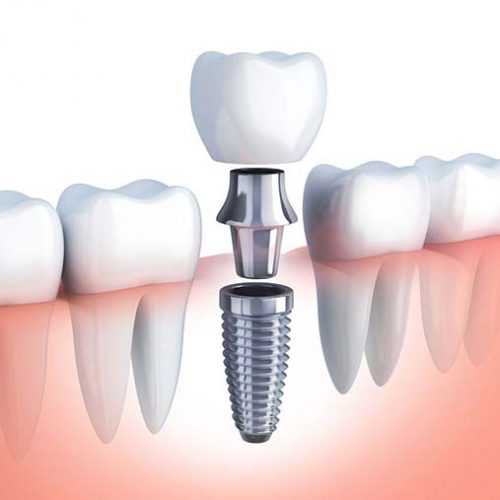Dental Implant
What is dental implant and how it is placed in mouth
A dental implant is a small titanium post that is surgically placed into the jawbone to replace a missing tooth or teeth. It is a popular and eftective option for restoring the natural appearance and function of teeth that have been lost due to various reasons such as tooth decay, gum disease, or injury.

Here's what happens during the dental implant procedure:
Step 1: Consultation
The dentist will examine your mouth and take X-rays to determineif you are a candidate for a dental implant.
They will also discuss your medical and dental history, as well as your expectations and goals.
Step 2: Preparation
The dentist will prepare your mouth by cleaning and numbing the arca where the implant will be placed. They
may also remove any damaged or infected tissue.
Step 3: Placement
The dentist will make an incision in the gum tissue to Cxpose the jawbone, then drill a hole into the bone for the
implant. The implant is then placed into the hole and secured in place with a screw-like mechanism.
Step 4: Healing
The gum tissue is then stitched closed, and the implant is left to heal for several months. During this time, the
bone grows around the implant, anchoring it in place.
Step 5: Abutment and Crown
After healing, the dentist will atach an abutment to the implant, which serves as a connector between the implant
and the crown (tooth replacement). A crown is then attached to the abutment, matching the surrounding tecth in
shape, size, and color.
Benefts
1. Natural look: Dental implants look and feel like natural tecth.
2. Improved chewing: Implants allow for normal biting and chewing functions.
3. Confidence booster: Implants can boost self-confidence and improve oral health.
4. Long-Hasting: With proper care, dental implants can last for decades.
5. Bone preservation: Implants help preserve surrounding bone density.
Benifits of dental implant compared to bridge and crown in dentistry.
When it comes to replacing missing teeth, dentists often recommend dental implants, bridges, or crowns. Each
option has its pros and cons. Here’s a comparison of the benefits of dental implants versus bridges and crowns:
Dental Implants
Benefits:
1. Long-term solution: Dental implants can last for decades with proper care.
2. Natural appearance: Implants look and feel like natural teeth, with a natural chewing and biting cxperience.
3. Preserves surrounding bone: Implants help preserve the surrOunding bone density, which can prevent facial sagging and promote a more youthtul appearance.
4. Improved speech: Implants allow for normal speech patterns, without the clicks and clacks associated with removable dentures.
5. No need to grind adjacent teeth: Unlike bridges, dental implants don’t require grinding down adjacnt tocth for support.
6. No risk of decay or gum disease: Implants are resistant to tooth decay and gum disease, making them a hcalthier option.
Dental Bridges
Benefits:
1. Less invasive procedure: Bridges are a more conservative procedure compared to dental implants, as they don’t require surgery.
2. Faster treatment time: Bridges can be placed in a few appointments, whereas implants require several months for healing.
3. Lower upfront cost: Bridges are generally less expensive than dental implants.
4. Quick adjustment period: Bridges are designed to be adjusted quickly, allowing patients to enjoy their new Smile sooner.
Ultimately, the best choice depends on individual needs, budget, and preferences.
Dental implants are often recommended when:
- Multiple teeth need replacement
- Bone loss is significant
- Anatural look and feel is desired
- Long-term durability is necessary
Bridges might be suitable for:
- Single-tooth replacement
- Quick fix for temporary gaps
- Limited budget
Crowns could be a good option for:
- Single-tooth replacement
- Quick solution for minor tooth loss
- Temporary restoration before considering a more permanent solution
Consult with your dentist to determine the best option for your specific situation!
